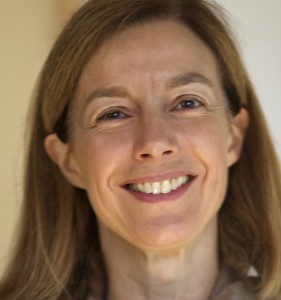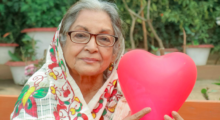Marguerite Maneau-Rao, LCSW, ATR, is the CEO and founder of the Presence Care Project. Once a volunteer at Zen Hospice, she now focuses on mindfulness based techniques to reduce stress among those suffering from dementia and their caregivers. She is a licensed clinical social worker and registered art therapist with a mindfulness-based psychotherapy private practice in Palo Alto, CA. She also facilitates the Stanford Parkinson’s Caregiver Support Groups. She shares her mindfulness practice in the Mind Deep blog and on Huffington Post.
Katie: What is the Presence Care Project?
Marguerite: It’s a nonprofit and the goal is to disseminate mindfulness-based dementia care and training throughout the whole spectrum of organizations that have caregiving going on.
Katie: What is it mindfulness based care?
Marguerite: It’s using mindfulness as a practice to help care providers and those with neuro-cognitive conditions to help them reduce stress and provide the best care possible. Mindfulness as a practice has been proven in 120 research studies to have benefits in terms of stress reduction, improvement in telomeres and chromosomes and cellular aging — all positive, restorative effects caused by mindfulness.
As you probably know, caregiving for dementia and other high care conditions often causes high emotional and physical stress. Mindfulness helps the caregiver be present for the person regardless of what’s happening in that moment. We train caregivers to respond as opposed to react. We help heighten sensory awareness to understand the stimuli that the person is subjected to. You can change their environment so it doesn’t stress the that person so much. In the case of dementia and memory loss, it helps to be in the present moment and meet them in their reality. There are many, many reasons for why mindfulness helps with quality of care.
Katie: What is your role and how did you get involved with the Presence Care Project?
Marguerite: It started with my mom, who had a long journey with Alzheimer’s that started ten years ago. First, I became aware of her symptoms. I experienced a wide range of emotions, and bringing mindfulness to our relationship changed how she reacted to me. It was very positive and took me away from the despair, frustration and anger I was
feeling. I experienced a more hopeful and joyful way of being with her. In the course of my work with Zen Hospice, I saw the impact of training as a volunteer and the kind of relationship that could be had. I was comparing how a person would react differently to different treatment. I became influenced to combine stress reduction with my clinical training and also my group facilitator training.
I was wondering if there was something that existed to support caregivers, and there was no specific curriculum for them to address the challenges of dementia. So I decided to create my own. I partnered with OSHA, the center for preventative medicine. I have been consulting for several organizations and senior communities and kind of used these communities as my sandbox where I could experiment [in] different ways. I also give a lot of shorter trainings (one to two hours) in many communities. Now I’m looking at giving daylong intensive trainings in Modesto. I’m riding this new wave just starting in the field of dementia care and it’s very exciting. I can see how it works and what impact it has on people, and it has ripple effects. They bring it to their family members and other institutions and the benefits spread.
Katie: What kind of services do you provide?
Marguerite: There’s the training, [which] is eight weeks [and] that’s based on the mindfulness stress reduction model. It is tailored specifically to dementia care. Each week, it follows the same format, teaching traditional mindfulness practices, body scan, loving kindness and experimental approaches to dementia care. There is an element of group sharing where participants talk about what’s happening to them as professional caregivers or family. There is also some homework to practice between classes. When I give shorter trainings, I just simplify it so they can come away with one thing they will actually do. They usually come away with one thing that works and I’ve heard back from them about it. With institutions, I tailor it a little differently. The trainings at UCSF are two to three hours at a time. It depends, and I adapt it to every institution.
Katie: Is there anything else you’d like our readers to know?
Marguerite: I do private coaching and I keep my private practice going, which is exclusively mindfulness based. I work with caregivers and those with cognitive disabilities from spinal or brain injuries to those who’ve had a stroke. I work directly with the person, with caregivers, or [with] both at once. I can work remotely via Skype or phone. And I enjoy sharing through my writing on different blogs and on twitter. I compose small tweets about the practice and invite people to join me. I also want to add that end-of-life definitely comes into the picture of mindfulness based training, which helps with stress reduction as a loved one is nearing the end-of-life experience.
Katie: Thanks, Marguerite!
Marguerite: Thank you.

 What is the Presence Care Project? An Interview with Marguerite Manteau-Rao
What is the Presence Care Project? An Interview with Marguerite Manteau-Rao





 Having an Estate Plan Is Essential – So Is Discussing It With Your Children
Having an Estate Plan Is Essential – So Is Discussing It With Your Children

 “Summons” by Aurora Levins Morales
“Summons” by Aurora Levins Morales














